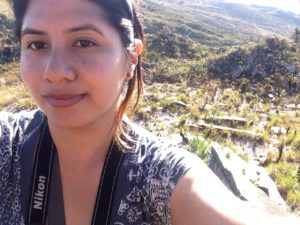My name is Verónica Zepeda and I´m from Mexico City. I am a biologist. I did my bachelor´s degree at UNAM (National Autonomous University of Mexico). At that time my thesis was about demography and nurse-protégé association of an endemic cactus. Then, for my master´s degree I studied whether the magnitudes of facilitation and competition were related with seed size. Currently, I am in the last stage of my PhD and my research focus on mechanisms of species coexistence. I quantified the relative importance of different coexistence mechanisms. Also, I tested whether seed banks and perennity contribute to coexistence by buffering the negative effects of competition on population growth rates. For the third chapter of my thesis I am assessing the effect of phylogeny on population dynamics and in consequence on species coexistence.
As well as other studies, I have found that niche differences allow species coexistence. In a future I want to explore what functional traits promotes niche or fitness differences at spatial and temporal scales. I am also interested in explore what functional traits allow species to «manage» climate variability and the outcome of competition. This is why I got interested in the course. My main goal is to have a deeper understanding of functional traits in order to have a clearer idea about how I am going to answer my questions. Because right now I don´t have a clue of what to measure and why.
I am so excited about the course and trip for many reasons. This is the first time that I am going to attend to an international course. This will be the first time that I am going to be working and discussing with non-Spanish speakers. I will be completely out of my comfort zone, but that´s a good thing. For me, the course represents a great opportunity to know other ways of working as well as know more about other cultures and topics. I am very enthusiastic about the fieldwork at the Puna and the accommodation in Wayqecha. I have never been in Peru and I can wait for experience its culture, especially the food. Also, I am very curious about the interviews to the farmers.
About climate change. To be honest I don´t know what to anticipate about the climate change´s perception of Peruvians. In my country the weather has changed a lot. The frequency and severity of the hurricanes have increased. The winters and droughts are more severe in many places. The rainy season is not as it used to be. Now it is concentrated in specific events followed by a long drought period. Last year there was a lot floods in many parts of the country, which caused some serious problems. The sewer system was exceeded in many places of Mexico City, many rivers overflowed, many crops were lost, etc. Mexico City is running out of water because the aquifers cannot be in their maximum capacity and also because it is an overpopulated city. However, even when people are aware of those serious climatic events I don´t think that they are willing to change their life styles or at least not for taking care of the planet. Younger people seem to be more concerned about it. I hope younger generations were more proactive and that they implement some changes because they will be suffering the severity of climate change. Note: I am not positive about the true of the facts because I have never analysed the data, this is just my interpretation of what do I see on the news and my personal experience.

Hi Veronica! Your thesis work sounds super interesting and I hope to hear more about your work in Peru!